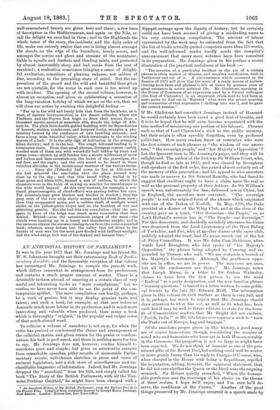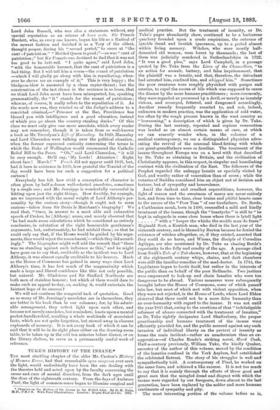AN ANECDOTAL HISTORY OF,PARLIAMENT.* IT was in the year 1872
that Mr. Jennings and his friend Mr. W. S. Johnstone brought out their entertaining Book of Parlia- mentary Anecdote, and the favourable reception of that volume has encouraged Mr. Jennings to compile the present work, which differs somewhat in arrangement from its predecessor, and contains a much greater amount of matter. There is a detestable fashion abroad of sneering at a certain class of very useful and interesting books as " mere compilations," but we confess we have never been able to see the point of the con- temptuous epithet. The mere compilation can hardly, perhaps, be a work of genius, but it may display genuine taste and talent; and such a book, for example, as that now before us demands much more labour in its production, and is much more interesting and valuable when produced, than many a book which is thoroughly "original," in the popular and vulgar sense of that much-abused word.
To criticise a volume of anecdotes is not easy, for when the critic has praised or condemned the choice and arrangement of the collected stories, and given reason for the praise or condem- nation, his task is performed, and there is nothing more for him to say. Mr. Jennings does not, however, confine himself to anecdotes pure and simple; but gives us noteworthy extracts from remarkable speeches, pithy records of memorable Parlia- mentary events, well-chosen sketches in prose and verse of eminent legislators, and a rich store of miscellaneous and un- classifiable fragments of information. Indeed, had Mr. Jennings dropped the " anecdotal" from his title, and simply called his book "The Story of the British Parliament, with all the Tire- some Portions Omitted," he might have been charged with a
An Anecdotal History of the British Parliament, from the Rarlieit Periods to the Present Time. Compiled from Authentic Sources by George Henry Jennings. New Edition. London : Horace Cox, Law Times Office.
flippant outrage upon the dignity of history, but he certainly could not have been accused of giving a misleading name to his very entertaining compilation. The amount of labour represented by the work may be estimated from the fact that the list of books actually quoted comprises more than 150 works, and the well-informed reader hardly needs the compiler's announcement that many more volumes have been consulted in its preparation. Mr. Jennings gives in his preface a recent illustration of the practical usefulness of his book :—
" The occasion of a particular incident or the use of a certain phrase is often matter of dispute, and requires verification; both in Parliament and out of it. A circumstance which occurred in the Session of 1876 will show that the want of a ready means of authen- ticating such facts and phrases is felt at times by persons even of great eminence in active political life. Mr. Gladstone, speaking in the House of Commons of an expression used by a former colleague (the Earl of Clarendon) in an important crisis, said he had been at some pains to find out in Hansard' what were the actual meaning and connection of that expression (` drifting into war '), and ho gave the correct version."
If Mr. Gladstone had consultel Jennings instead of Hansard he would certainly have been saved a good deal of trouble, and it is to be hoped that he will soon become acquainted with the true method of minimising one portion of his labours. Phrases such as that of Lord Clarendon's stick to the public memory, but their origin is often speedily forgotten, even by professed politicians. How many readers know or remember who were the first coiners of such phrases as " the wisdom of our ances- tors," " the sovereign people," and " her Majesty's Opposition "P Let the ignorant turn to Mr. Jennings's pages, and they will be enlightened. The author of the first was Sir William Grant, who, though he died so late as 1832, and was classed by Brougham with speakers of the first order, has passed almost entirely out of the memory of this generation ; and his appeal to wise ancestors was made in answer to Sir Samuel Romilly, who had dared to suggest that creditors ought to have a claim upon the real as well as the personal property of their debtors. As Sir William's speech was, unfortunately for him, delivered not in China, but in England, the ancestors were outvoted. "The sovereign people" is not the original form of the phrase which originated with one of the Dukes of Norfolk. In May, 1798, the Duke presided at a dinner of the Whig Club, and at the close of the evening gave as a toast, " Our Sovereign—the People," or, as Lord Holland's version has it, "The People—our Sovereign." For this democratic and decidedly undukely utterance his Grace was dismissed from the Lord-Lieutenancy of the West Riding of Yorkshire, and Fox, who, at another dinner of the same club, publicly adopted the toast, had his name struck out of the list of Privy Councillors. It was Mr. John Cam Hoblionse, after- wards Lord Broughton, who first spoke of " his Majesty's Opposition," the phrase being adopted by Canning and ex- pounded by Tierney, who said, " We are certainly a branch of his Majesty's Government. Although the gentlemen oppo- site are in office, we are in power. The measures are ours, but all the emoluments are theirs." Mr. Jennings notes that Joseph Hume, in a letter to Sir Joshua Walmaley, claims to have been the first person to use the word • ` Radical" as a party designation, and the now familiar phrase " burning questions " is traced to a letter written to some politi- cal friends by the late Mr. Edward Miall. The information given in this volume on such matters as these is very full, and it is, perhaps, too much to expect .that Mr. Jennings should draw attention to what has not, as well as to what has, been said; but it may be well in future editions to state, for the bene- fit of Conservative readers, that Mr. Bright did not exclaim, "Perish, India !" or Mr. Gladstone ever express a wish to " turn the Turks out of Europe, bag and baggage."
Of the anecdotes proper given in this history, a good many are of course humonrous, though, considering the number of noted wits and humorists who have sat in both Muses, notably in the Commons, the proportion is not so large as might have been expected. We do not think of humour as one of the pro- minent gifts of Sir Robert Peel, but nothing could well be neater or more grimly funny than his reply to Feargus O'Connor, who, when charged in the House with being a Republican, repelled the imputation, adding, however, the equivocal statement that he did not care whether the Queen or the Devil were the reigning monarch. Sir Robert quietly remarked, " When the honour- able gentleman sees the Sovereign of his choice on the throne of these realms, I hope he'll enjoy, and I'm sure he'll de- serve, the confidence of the Crown." Another of the good things preserved by Mr. Jennings occurred in a speech made by Lord John Russell, who was also a statesman without, any special reputation as an utterer of bons mots. Sir Francis Burdett, who, as every one knows, began his life as a Radical of the newest fashion and finished it as a Tory of the oldest, thought proper, during his "second period," to sneer at "the cant cf patriotism." " Mobled Queen is good ;"—so was " cant of patriotism ;" but S:r Francis was destined to find that it was not too good to be bettered. " I quite agree," said Lord John, " with the honourable baronet, that the cant of patriotism is a bad thing. But I will tell him a worse—the recant of patriotism —which I will gladly go along with him in repudiating, when- ever he shows me an example of it." This is very happy ; the bludgeon-blow is answered by a clean rapier-thrust; but the construction of the last clause in the sentence is so loose, that we think Lord John must have been misreported, for, speaking grammatically, the " it" stands for the recant of patriotism; whereas, of course, it really refers to the repudiation of it. As the words now run, they remind us of the Judge's address to a convicted criminal,—" Prisoner at the Bar, Providence has blessed you with intelligence and a good education, instead of which you go about the country stealing ducks." Of this class we must only give one more anecdote, which every reader may not remember, though it is taken from so well-known a book as Mr. Trevelyan's We of Macaulay. In 1829, Macaulay and Lord Clarendon were talking over the political situation, when the former expressed curiosity concerning the terms in which the Duke of Wellington would recommend the Catholic Relief Bill to the Peers. " Oh," said Lord Clarendon, " it will be easy enough. He'll say, My Lords ! Attention ! Right about face ! March !' " Punch did not appear until 1841, but, had it been in existence in 1839, how grateful the Tenniel of the day would have been for such a suggestion for a political cartoon !
Everybody has felt how vivid a conception of character is often given by half a-dozen well-selected anecdotes, sometimes by a single one ; and Mr. Jennings is wonderfully successful in hitting upon just the right things. How forcibly, for example, are we impressed with the moral weight of Lord Althorp's per- sonality by the curious story—though it ought not to seem curious—taken from Sir Denis le Merchant's biography ! We read that, " Once, in answer to a most able and exhaustive speech of Croker, he [Althorp] arose, and merely observed that he had made some calculations which he considered as entirely conclusive, in refutation' of the right honourable gentleman's arguments, but, unfortunately, he had mislaid them ; so that he could only say that, if the House would be guided by his argu- ments, they would reject the amendment,'—which they did accord- ingly." The biographer might well add the remark that " there was no standing against such influence as this," and he might have gone on to say that, creditable as the incident was to Lord Althorp, it was almost equally creditable to his hearers. Much as the House of Commons has gained in many ways since Lord Althorp's time, it has lost much of the magnanimity which made a large and liberal confidence like this not only possible, but natural. Mr. Gladstone and Sir Stafford Northcote are both men of stainless honour; but which of them would dare to make such an appeal to-day, or, making it, would entertain the faintest hope of its success We will not continue the congenial task of quotation. Good as so many of Mr. Jennings's anecdotes are in themselves, they are better in his book than in our columns; for, by his admir- able arrangement, they reflect light upon each other, and become not merely anecdotes, but reminders; knots upon a mental pocket-handkerchief, recalling a whole multitude of associated facts, which are not quite forgotten, but stowed away in obscure cupboards of memory. It is not every book of which it can be said that it will be in its right place either on the drawing-room table, to be taken up in the odd ten minutes before dinner, or on the library shelves, to serve as a permanently useful work of reference.



































 Previous page
Previous page